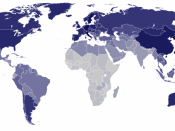An analysis to investigate the extent of the influence of environmental and genetic factors on intelligence
What is intelligence? If this question is asked to many different people, the possible answers could be the level of understanding of complicated opinions, accustoming to the circumstances, learning and reasoning skills, capability of solving problems etc. There are a lot of definitions for intelligence; however no conceptualization has yet established as a fully satisfying definition (Neisser, Boodoo, Bouchard, Boykin, Ceci, Halpern, Loehlin, Perloff, Stenberg, & Urbina, 1996). As a matter of fact, when 24 well-known theorists were asked to define intelligence, they gave 24 different definitions (Sternberg & Detterman,as cited in Neisser et al., 1996). Hence, in order to prevent misunderstandings, this essay uses the word intelligent in the meaning of general cognitive ability.
Neisser et al.(1996) stated that some social and biological variables have some influences on intelligence. People vary from one another in their intelligences.
What causes this variation? Mostly genetic factors or mostly environmental factors or both in equal weight? The proportion of influence on intelligence can be explained by IQ studies which will be discussed in further analysis. This paper aims to research the extent of the influence of environmental and genetic factors on intelligence by benefiting past studies and findings. The idea that genetic factors are slightly more influent on intelligence than environmental factors, is supported with evidences and explanations.
How do environmental factors affect intelligence? The social variables, which include occupation and schooling, have some influence on intelligence. Firstly, work environment may influence the intelligence of their workers. Kohn and Schooler (1973) had interviewed some 3,000 men who were farmers, managers, machinists, porters, etc. They argued that, having more complicated jobs provides more intellectual flexibility. Although this discussion was not fully clear in their study, it remains...


